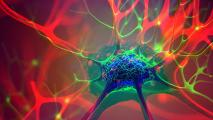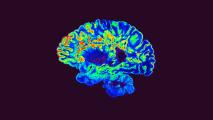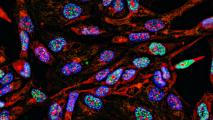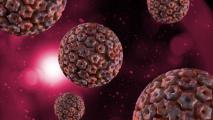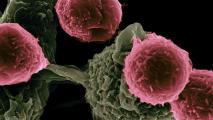
Biotech
Human history has been all but defined by death and disease, plague and pandemic. Advancements in 20th century medicine changed all of that. Now advancements in 21st century medicine promise to go even further. Could we bring about an end to disease? Reverse aging? Give hearing to the deaf and sight to the blind? The answer may be yes. And soon.
More
Breakthrough study discovers that psychedelics breach our neurons
Researchers have discovered that psychedelics can activate 5-HT2A receptors inside of cortical neurons, a possible cause of their therapeutic effects.
Oral bacteria trigger rheumatoid arthritis flare-ups
Periodontal (gum) disease is more common in individuals with rheumatoid arthritis, implicating the former in causing the latter.
First at-home test can tell you if it’s COVID or flu
The FDA has granted authorization to an at-home test that can tell COVID from flu, the first of its kind.
Psychedelics are helping dying patients overcome their existential distress
End of life patients face existential and spiritual challenges other patients do not. Psychedelics may be uniquely suited to helping them.
New MS treatment targets the gut microbiome
We may be able to prevent chronic inflammation in multiple sclerosis patients by manipulating their gut microbiomes.
Small wonders: The antibodies from camels and sharks that could change medicine
A handful of animals make a pared-down version of our own antibodies. Scientists hope to harness them as treatments for human illnesses.
Inhaling this powder shields lungs from infection
An inhalable powder that acts as an “invisible mask” for the lungs could potentially help end the COVID-19 pandemic.
New light therapy could make cancer treatment better and safer
A new light-activated cancer treatment developed in the UK could make existing therapies better and safer.
A new look at the strange case of the first gene-edited babies
Did He Jiankui “Make People Better”? A new documentary leans toward a different narrative about gene-editing than we’ve heard before.
First: Spinal cord stimulation helps stroke survivors control arms again
Spinal cord stimulation has been shown to improve upper-limb mobility in stroke survivors for the first time.
New study discovers how to reverse hearing loss
A new study of hair cell regeneration in mice could help researchers figure out how to reverse hearing loss in people.
This $1 pill cuts binge drinking
Naltrexone, a medication that costs less than $1 per dose, helped people cut back on their binge drinking in a small study
Herpes virus helped kill a deadly form of breast cancer in a clinical trial
A combination of an engineered herpes virus and chemo showed promise for treating triple-negative breast cancer in a small study.
A single dose of an old drug could save 2 million mothers from sepsis every year
A large international study has found that a single oral dose of a common antibiotic can “significantly” reduce the risk of maternal sepsis
How diet influences the conflict between cell “cooperators” and “cheaters”
Cancer-protective microbes support cooperative behaviour by bodily cells, but cancer-inducing microbes undermine it.
Startup plants first GMO trees designed for carbon removal
Living Carbon is ready to begin planting thousands of GMO trees engineered to pull 27% more carbon from the air.
Will “The Singularity” rescue us from death?
In transhumanism, “The Singularity” promises possibility of uploading your consciousness into silicon, guaranteeing a kind of immortality.
Strange life forms create an “alien” ecosystem in an abandoned uranium mine
Scientists have found diverse life forms dwelling in an abandoned, flooded uranium mine in Germany, creating an “alien” ecosystem.
Yoga: Modern research shows a variety of benefits to both body and mind from the ancient practice
Researchers have begun to study yoga’s effects and are finding that it has great benefits for both mental and physical health.
Get inspired with the most innovative stories shaping the world around us.













